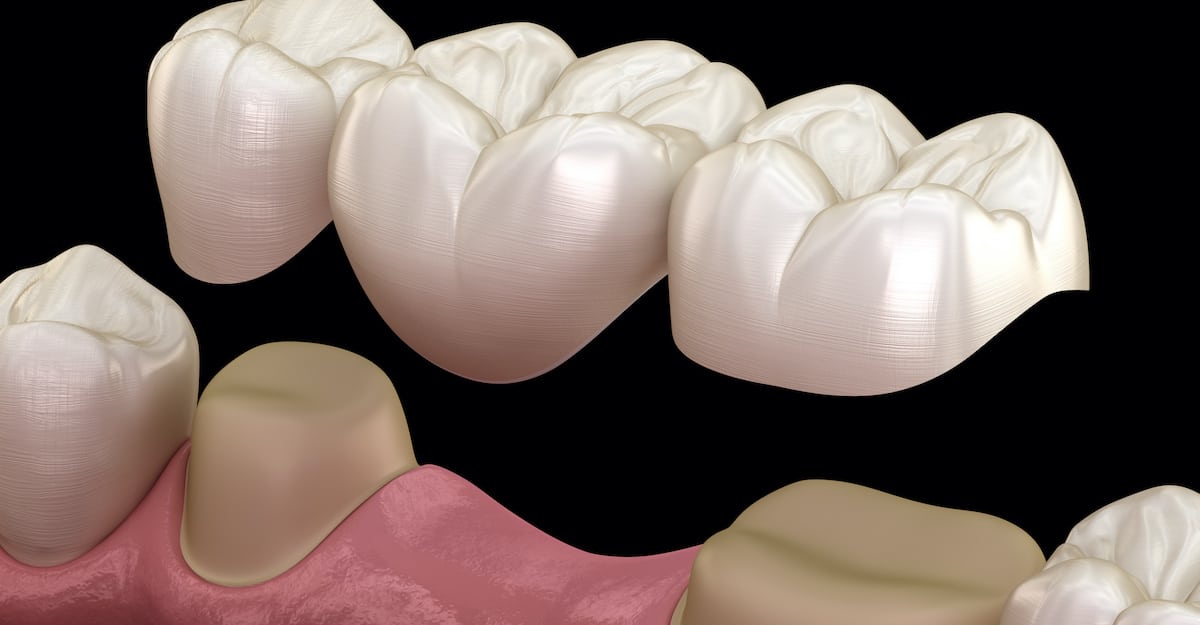A dental bridge is a great prosthetic option for people wanting to replace one or a few teeth. One of the great things about a dental bridge is that it restores function and aesthetics but is also a durable and cost effective option. The longevity of dental bridges can vary depending on the type of bridge, the materials used, and the patient’s oral hygiene habits. On average, dental bridges typically last anywhere from 5 to 15 years.
What is a Dental Bridge?
A dental bridge is a prosthetic device used to replace one or more missing teeth. It is made up of two crowns that are placed on either side of the gap created by the missing tooth and a false tooth in between them. The crowns are attached to the adjacent teeth, also known as abutment teeth, and the false tooth is called a pontic.
Types of Dental Bridges
There are three main types of dental bridges: traditional bridges, cantilever bridges, and Maryland bonded bridges. Traditional bridges are the most common type and involve placing crowns on both abutment teeth with a pontic in between them. Cantilever bridges involve placing a crown on just one abutment tooth with a pontic attached to it. Maryland bonded bridges involve attaching metal wings to the back of the pontic, which are then bonded to adjacent teeth using resin or metal bands.
Factors that Affect Longevity
The type of bridge used will affect how long it lasts as some materials may be more durable than others. Additionally, proper oral hygiene habits such as brushing twice daily and flossing daily can help extend the life of your bridge by preventing decay and gum disease around it. Regular visits to your dentist for checkups and cleanings can also help keep your bridge in good condition for longer periods of time.
You can easily extend the lifespan of your bridge by taking some of the following steps:
- Watch for signs of teeth grinding: if you notice you grind or clench your teeth, it can compromise the integrity of the bridge and make it more likely to need replacement over time. Instead, ask your dentist about getting a night guard to protect your bridge and natural teeth.
- Watch what you eat: eating certain foods that are hard and crunchy like bones, hard candies, etc. can cause damage to your bridge because of extreme pressure. Try to avoid biting things like pen caps, ice, etc.
- Keep up with your hygiene: there is no greater thing you can do for your teeth and bridge than by brushing regularly. Yes, you can get recurrent decay under bridges if they aren’t sealed properly or if there is decay on the root. Use floss threaders and a water pick to ensure all pesky bacteria doesn’t remain sitting under your bridge.
- Materials used for your bridge can affect longevity: When materials like an implant supported bridge are used, they are highly durable and can remain in excellent shape for many years. When a bridge relies on one tooth (Cantilever bridge) or metal wings (Maryland bridge), it may have a shorter lifespan because of less strength and durability. Metal and porcelain bridges tend to be more durable than composite or ceramic bridges.
Why does a bridge need to be replaced?
Over time a bridge may need to be replaced because it is worn down, fractured, or there is tooth decay underneath the teeth used as anchors. If there is improper cementation of the abutment crowns, they may need to be replaced or adjusted.
There are times when a dentist can adjust a bridge and re-cement it, but sometimes replacement is recommended.
In many cases, the existing support teeth become weak from either tooth decay or gum disease and compromise the integrity or the bridge. This is why it is so important to maintain good oral health for your natural teeth so that they don’t become a weaker support system for the bridge.
Are dental bridges a good investment?
A dental bridge is a great option for people who want to restore the function to speaking and chewing properly. A bridge also prevents your adjacent teeth from shifting and creating a bite problem. They are a fixed prosthetic, meaning you don’t need to take them out like dentures.
There are other dental alternatives to a bridge like a denture or implant, but like any dental treatment comes with upsides and downsides. If you are interested in getting a dental bridge, speak with your dental professional to see if it is a good option for you.
Conclusion
Dental bridges can last anywhere from 5 to 15 years depending on the type of bridge used, materials used, and patient’s oral hygiene habits. Proper care and maintenance can help extend the life of your bridge so it’s important to follow your dentist’s instructions for proper care after placement. If you have any questions about how long your dental bridge may last or what type would be best for you contact Caldwell, Bills, Petrilli & West today!

